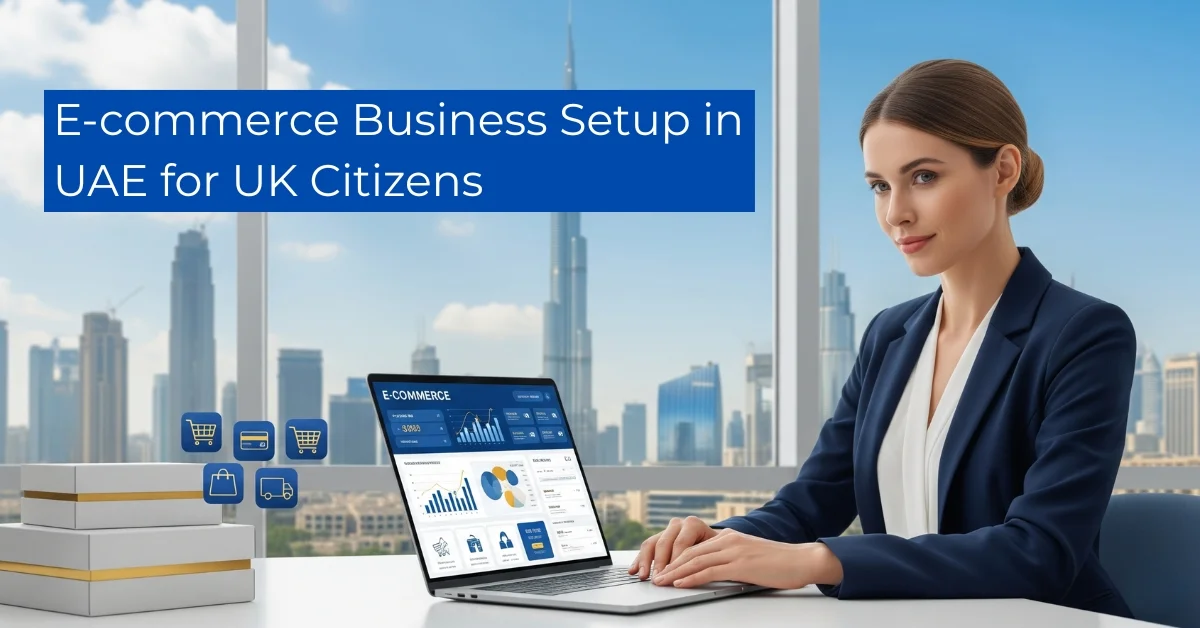Introduction
The UAE has become one of the fastest-growing hubs for online businesses in the world. With a strong digital economy, advanced infrastructure, and investor-friendly policies, it attracts entrepreneurs from every corner of the globe. For UK citizens, the Emirates presents an excellent opportunity to launch and expand online businesses in a tax-friendly and global trade environment.
E-commerce Business Setup in the UAE is becoming a popular choice for UK citizens who want to tap into the Middle East’s booming online retail market. From flexible licensing options to quick company registration, the UAE offers everything an entrepreneur needs to succeed.
Why UAE is Attractive for UK Entrepreneurs
The UAE has built a reputation as a safe, innovative, and profitable business destination. For UK entrepreneurs exploring new markets, here are the main reasons why the UAE stands out:
- Business-friendly regulations: The government has streamlined company registration, license issuance, and visa processes to encourage foreign investors.
- Tax advantages: The UAE has 0% personal income tax and competitive corporate tax rates, making it far more appealing than many European markets.
- Growing e-commerce market: With tech-savvy consumers and a high internet penetration rate, the UAE’s online shopping industry is expanding rapidly.
- Strategic location: The country sits between Europe, Asia, and Africa, giving UK businesses access to over two billion consumers.
Steps for E-commerce Business Setup in the UAE
Setting up a business in the UAE may sound complex, but the process is straightforward when broken down into steps.
Step 1: Choose a business jurisdiction
You must decide between Mainland and Free Zone setups. Free Zones are ideal for foreign ownership, while the Mainland allows broader trade within the UAE market.
Step 2: Select your activity and trade name
UK citizens must define their e-commerce activity (such as online retail, digital marketplace, or consultancy) and register a unique business name.
Step 3: Apply for the e-commerce license
The e-commerce license is mandatory for selling online in the UAE. Free Zones and Mainland authorities both issue licenses, but costs and benefits vary.
Step 4: Apply for visa and residency
With a business license, UK entrepreneurs can apply for residency visas. This also opens the option to sponsor family members and employees.
Step 5: Open a UAE bank account and set up payment gateways
Banking and secure payment integration are essential for smooth operations. The UAE offers multiple local and international banking options.
What Documents Do UK Citizens Need for E-commerce Setup in UAE?
When starting an online business in the UAE, UK citizens must prepare essential documents. These may vary slightly depending on the chosen Free Zone or Mainland authority.
- Valid passport copy with a minimum of six months ‘ validity
- Recent passport-size photographs
- Proof of UK address (utility bill or tenancy contract)
- Business plan (required in certain Free Zones)
- Memorandum of Association (MOA) if there are multiple shareholders
Cost of E-commerce Business Setup in UAE
The cost of setting up an e-commerce business in the UAE depends on the jurisdiction and business needs.
- Free Zone license packages: Usually range between AED 8,000 – AED 15,000 per year.
- Mainland licenses: May be slightly higher but provide more trading flexibility.
- Hidden costs: Include visa processing, office space rental, health insurance, and bank account charges.
On average, UK citizens can expect total startup costs between AED 12,000 – AED 25,000, depending on their chosen business model.
Mainland vs Free Zone for E-commerce in UAE
Both Mainland and Free Zones have their own benefits for UK entrepreneurs.
- Free Zones: Offer 100% foreign ownership, full profit repatriation, and simplified processes. Popular for startups and small businesses.
- Mainland: Better suited for businesses that plan to trade directly with UAE consumers or government entities. Provides broader market access.
The right choice depends on business goals, size, and target market.
Can UK Citizens Own 100% of Their E-commerce Business in UAE?
Ownership laws have evolved in recent years.
- Free Zones: UK citizens can own 100% of their business with no local partner required.
- Mainland: Previously required a local sponsor, but now many activities allow 100% foreign ownership.
This flexibility gives UK entrepreneurs the freedom to structure their businesses as they prefer.
Do UK Citizens Need a Visa for E-commerce Business in UAE?
Yes, UK citizens require a visa to legally live and operate their business in the UAE.
- Investor Visa: Granted to business owners when they register their company.
- Family Visas: Entrepreneurs can sponsor their spouse, children, and dependents.
- Employee Visas: Available for staff hired under the business license.
Visas are generally valid for 2–3 years and renewable upon license renewal.
Best Free Zones in UAE for E-commerce Business Setup
The UAE offers several Free Zones tailored for e-commerce companies.
- Dubai CommerCity: Dedicated to digital commerce with advanced infrastructure.
- Sharjah Media City (SHAMS): Affordable packages for online startups.
- Ajman Free Zone: Cost-effective and quick setup for SMEs.
- Ras Al Khaimah (RAKEZ): Flexible packages with investor-friendly policies.
Each Free Zone provides unique benefits, so UK entrepreneurs can choose based on budget, target market, and operations.
Challenges UK Entrepreneurs May Face in UAE E-commerce Setup
Despite its advantages, UK entrepreneurs may face some challenges in the UAE:
- Cultural and market differences: Understanding local shopping behavior is key to success.
- Logistics: Delivery and last-mile logistics can be challenging in a competitive market.
- Payment gateways: Some gateways require additional approvals or documentation.
- Competition: The e-commerce market is thriving but also highly competitive, especially in popular niches.
Proper planning and local expertise can help overcome these obstacles.
Ripple Business Setup in the UAE
If you are a UK citizen planning your E-commerce Business Setup in the UAE, Ripple Business Setup can guide you through every step with ease. From choosing the right jurisdiction to handling licenses, visas, and banking, Ripple offers end-to-end consultancy tailored to your business goals. Their team ensures a smooth, hassle-free process so you can focus on growing your online business instead of paperwork.
- Call us at +971 50 593 8101
- WhatsApp: +971 4 250 0833
- Visit: www.ripplellc.ae
- Email: info@ripplellc.ae
FAQ
1. How long does it take to set up an e-commerce business in the UAE?
Company formation typically takes 5–10 working days if documents are ready.
2. What is the minimum investment required?
Depending on the Free Zone, setup costs can start from AED 8,000 onwards.
3. Can UK citizens run the business remotely?
Yes. With a valid license, many Free Zones allow remote management and even virtual offices.
4. Is a local sponsor required in 2025?
No, most e-commerce activities allow 100% foreign ownership without a local sponsor.
Conclusion
For UK citizens, setting up an e-commerce business in the UAE offers a unique mix of tax benefits, global access, and a thriving online market. The setup process is straightforward, with flexible options in both Free Zones and Mainland jurisdictions. Entrepreneurs can also enjoy 100% ownership, simplified licensing, and easy access to visas.
If you are a UK entrepreneur ready to expand, the UAE provides an ideal launchpad for your online business. Taking the right steps today can help you build a successful future in one of the world’s fastest-growing e-commerce markets.
Disclaimer: This content is for general informational purposes only and should not be taken as legal or business advice. Please consult a professional before making decisions.






